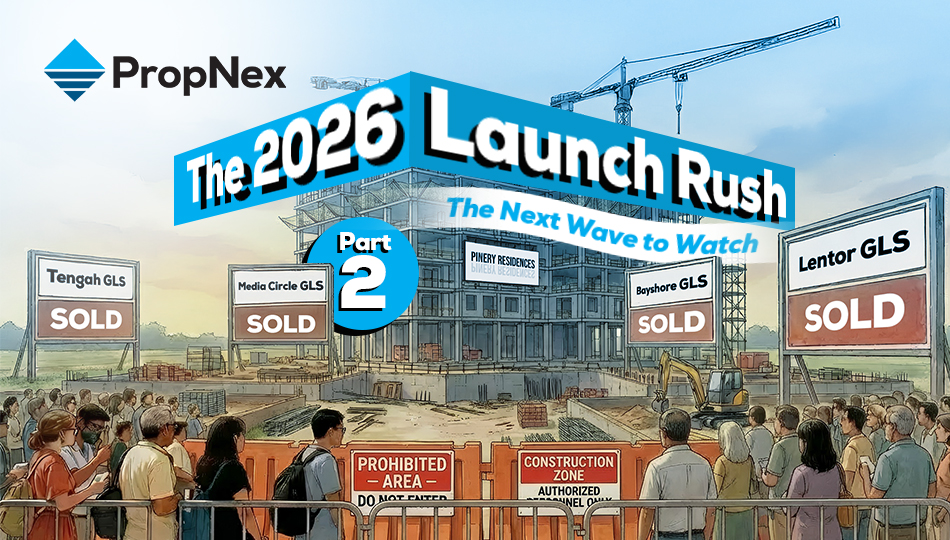New Code of Conduct for Leasing of Retail Premises in Singapore
New Code of Conduct for Leasing of Retail Premises in Singapore expected to become law soon
A Code of Conduct covering retail space leasing will soon turn into law, which will help to address long-standing tenancy issues faced by tenants when negotiating leases for retail premises as well as provide a dispute resolution framework to resolve conflicts between tenants and commercial landlords. PropNex’s Assistant Vice President, Lee Heng Eam offers a quick summary of what the new Code of Conduct entails and potential implications for landlords and tenants.
What is it?
In March 2021, Minister of State Low Yen Ling remarked, in response to the Fair Tenancy Pro Tem Committee's Launch of the Code of Conduct for the Leasing of Retail Premises in Singapore:
“The new Code of Conduct that has been announced by Singapore Business Federation is a major step forward for the retail sector. This is the result of industry-led efforts that have brought to the table key stakeholders to set and agree on new guidelines and negotiating principles for the leasing of retail premises.
We applaud this spirit of collaboration and cooperation, for it has not been easy for the retail sector since the COVID-19 pandemic struck. We know that all parties involved have worked very hard together to put the retail sector’s interest as priority and to move towards a fair and balanced position with regard to the leasing of retail premises. This constructive and considerate approach sets a very strong foundation for the retail sector to overcome its challenges and to emerge stronger in a post-COVID world. Consumers can certainly benefit from a more vibrant and competitive retail scene.”
In sum, the Code is an industry led-effort towards a fair and balanced position between landlords and tenants of retail premises, and to benefit consumers through a more vibrant and competitive retail scene. There is wisdom in Ms Low’s statement because costs are after all, transferred to consumers through the pricing of products and services.
So, what is it exactly?
The Code is not mandatory as at the date of writing, but will be mandatory when it becomes law. Version 2 of the Code dated 15 March 2022, with 39 pages (including cover page and content page), set out the following:
- The objectives of the Code;
- The Qualifying Retail Premises covered by the Code (approximately 3 pages);
- The guiding principles for the conduct of negotiations (Part A);
- 11 leasing principles for key tenancy terms (Part B);
- Sample clauses which can be included in tenancy/lease agreements to comply with the Code (Schedules 1, 2 and 3 of Part B);
- Data transparency (Part C);
- Dispute resolution and enforcement of the Code (Part D); and
- A checklist for the originator of the tenancy/lease agreements to fill in (i.e. to indicate which principle is followed and which one deviated) (Appendix 1 of Part D).
The 11 leasing principles cover:
- Exclusivity;
- Costs to prepare the lease agreement and 3rd party costs;
- Advertising ad promotion charge and service charge;
- Pre-termination by landlord due to landlord’s redevelopment works;
- Sales performance;
- Material adverse change;
- Pre-termination by tenants;
- Security deposit;
- Floor area alterations;
- Building maintenance; and
- Rental structure.
Each of the 11 leasing principles discusses the DO’s and DO NOT’S when negotiating clauses related to the 11 items.
Whether a leasing principle is mandatory or can be deviated if both the landlord and tenant agree, is also indicated. The checklist in Appendix 1 of Part D is an easy reference for this.
What type of premises is affected?
Whether a premise is covered by the Code will be determined by its use. If the use fails under Qualifying Retail Premises Uses, it will be covered by the Code, even if it is a push cart or kiosks.
How does it affect landlords?
If you are a landlord of Qualifying Retail Premises, there may be a need to review current practices and also lease documentation to prepare for D-Day.
It is to be noted that corporate and individual landlords of Qualifying Retail Premises are subject to the Code when it becomes law.
How does it affect tenants?
If you are a tenant of Qualifying Retail Premises, having knowledge of the Code will come in handy during lease negotiations when D-Day comes.
Will the Code be amended further?
From its inception until the time of writing, the Code has undergone some changes, and further changes to consider ground issues arising from implementation is very likely. Public consultation ended on 5 August 2022, and changes are highly anticipated (this is why the author did not even discuss any parts of the Code in detail). The lack of differentiation in application of the Code to big and small landlords/tenants may also play a part in the Code’s implementation when it becomes law.
How to comply with the Code?
Compliance is again voluntary for private landlords as of the date of writing. Should you wish to comply, questions to ask when negotiating and drafting lease documentation would be:
- What needs to be included?
- What needs to be deleted?
- What needs to be amended?
- What can be deviated?
- What must be complied with?
When the Code becomes law, PropNex salespersons and consultants will be prepared to launch new documentation to facilitate easy compliance with the Code, and also hold briefings for consumers and our associates.














